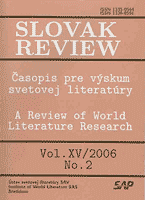Permeabilita multikultúrneho priestoru francúzskej literatúry. Jazyková identita. Dvojdomovosť a autorský preklad
Permeability of the Intercultural Space of French Literature.Language Identity. Dual Domicile. Authorial Translation
Author(s): Katarína BednárováSubject(s): Literary Texts
Published by: SAV - Slovenská akadémia vied - Ústav svetovej literatúry
Keywords: Literary Francophonie; Dual Domicile; Authorial Translation; Language Identity
Summary/Abstract: The study deals with reception of a piece of literature functioning in specific conditions of bilingual and biliterary communication and entering the metatextual process in the form of an authorial translation. The essential material research is based on a „non-French“ authors who had chosen French as their literary language, and at that they write the same works in their mother tongue or translate them for themselves, too (Beckett, Ionesco, J. Green, N. Nuston, Kundera) Literary francophonie, dual domicile of a piece of literature and authorial translation are three essential domains reflected in the study. These are as well connected with the research interest of Bednarova in the sphere of contemporary French literature (identity of the author, identity modeled in a text), and in the sphere of theory and praxeology of translation. The author grounds her thoughts on the thesis that literary works situated on the boundary-line of two languages, two literatures, existing in bilingual variants and auto-translations are a specific translation and reception problem, as they function in a specific intertextual situation and a potential intertextual apperception. When explaining this, the author uses terms as permeability, multicultural francophonie (French-speaking), bilinguism, biliterariness, transgression, intertext, architext, variant of a text, intertextuality. The author understands authorial translation as a typological problem, as the traditional theory of translation separates very most radically the sphere of the original as writing and creation, from translation as a metatextual activity. It is especially in the situation, when auto-translation is at the same time a rewriting of a text; the anomaly arises, regarding the traditional classification Similarly, it is not productive to understand authorial translation as an equivalent version of the original. It might be possible to study auto-translation as a piece of literature of plural immanence, or in terms of Genette´s auto-hypertextuality. When translating these works to a third language, a number of problems arise, some of which can only be solved by means of analysis of the authorial translation. The above mentioned analyses confirm the importance of the fact that the intercultural and multicultural aspect, which is moreover relevant in interpretation of a piece of literature, as well as its translation, should be considered in reception of foreign works of literature. The study is structured into five parts: introduction, literary francophonie literature written in French and postcolonial theories, language identity, authorial translation, and conclusion. The key idea of the study is 1. The status of French language in the European and world literary context as a universal language (Rivarol´s thesis and the myth of universality) and a literary language in the works of French-speaking authors and those not speaking French, 2.Change of language identity and its effects in literature.
Journal: Slovak Review of World Literature Research
- Issue Year: 2006
- Issue No: 02
- Page Range: 105-121
- Page Count: 17
- Language: Slovak

